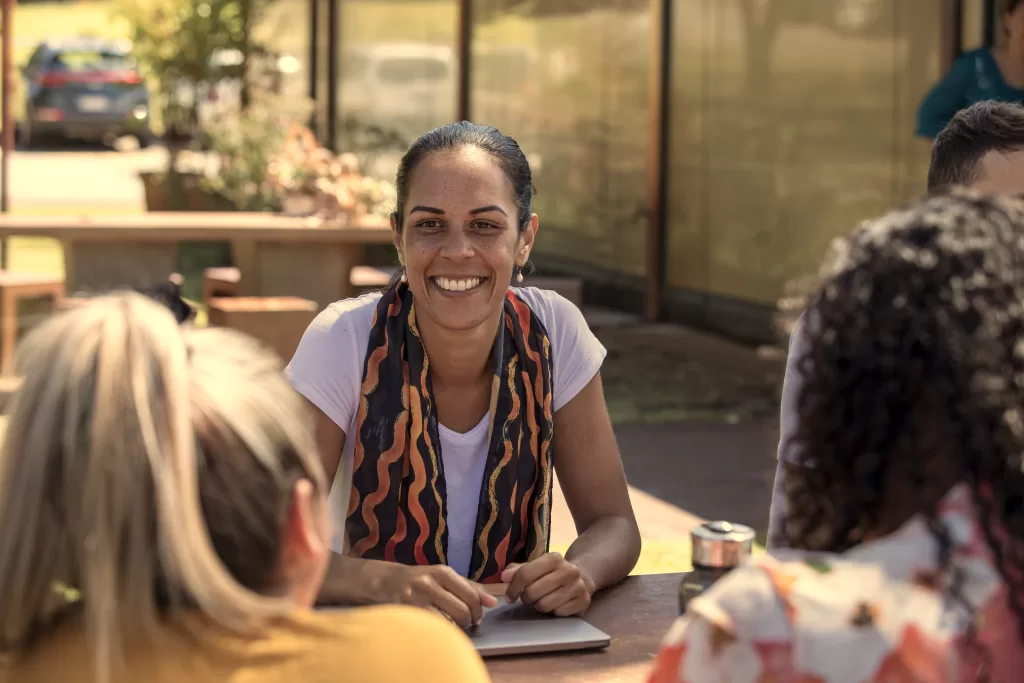
Local regions are experiencing the roll out of clean energy projects but often without having had community wide conversations about their future and about how they can all share in the benefits of this change. This has been dividing communities.
DemocracyCo is excited to announce this project – one which will support the Gippsland community (in SE Victoria) to consider how it can benefit from the development of Australia’s first large scale offshore wind farm.
Gippsland coastal communities are at the crux of a difficult time, with the proposed development of offshore windfarms. Gippsland hosts Australia’s first declared Offshore Wind Zone, and in 2024 the Australian Government granted 12 feasibility licences for offshore wind projects off Gippsland’s coast in Victoria.
Change of this scale needs more than just policy frameworks and investment – it requires trust, transparency, and genuine engagement with the communities who will be most affected.
We are partnering with the Gippsland Climate Change Network (GCCN) to support and host a large-scale deliberation. As a respected independent voice in the region, GCCN can help to facilitate a process where people are not just informed about but actively involved in shaping Gippsland’s energy future.
By partnering together on this deliberative democracy initiative, both GCCN and DemocracyCo are reinforcing their commitment to empowering local communities.
The image below shows the Offshore Wind Declared areas.

Engaging communities in their futures is certainly not new and in many instances engagement with local communities has already been happening around the construction of infrastructure to support energy transitions.
However, in many instances communities, industry, governments and leaders have continued to struggle with divisions as people grapple with change, and the impacts of that change.
In addition to this, from research undertaken by YouGov in January 2025, we know that 48% of people feel like they can’t trust information on energy, or the information they have is conflicting.
Deliberative methods seek to prevent these issues and address them early – by bringing together a diversity of the community to work together with industry, government, and leaders to find a way forward together. This Assembly will enable this community to access information they trust, to ensure they can deliberate together and also to support this change going forward.
Deliberative democracy (like Citizen Assemblies) provides a constructive environment for everyday people to learn deeply about an issue, and bring a diversity of voices to the discussion, not just the usual suspects and loud voices. They enable contemplation and time for participants to consider what needs to be done together.

The Assembly will consider the following question:
The assembly discussion will inform a set of recommendations around how these communities envision offshore wind delivering genuine benefits to their families, communities and coastal environment, and will be put forward to relevant industry and government bodies for response.

Over the next few weeks, 10,000 Gippsland households in postcodes from Inverloch to Loch Sport will be sent a postal invitation to register their interest to participate in the Assembly. We will also be reaching out to small but important community groups in the region to participate.
The invitations and democratic lottery process is being run by the Sortition Foundation, a global leader in sortition services.
Once registration has closed, a diverse group will be selected by lottery from those who registered their interest to take part.
The lottery process will be done in a way to make sure that the group selected are diverse and broadly representative of the community in terms or age, gender, location, cultural heritage, and educational attainment, our goal being to have an assembly that is a diverse sample of the Gippsland coastal community.
The Sortition Foundation will select 50 participants from those who register an interest.
There are a number of ways you can get involved in this project:

The Project Advisory Group is a coalition of key stakeholders and partners who are committed to supporting the deliberative engagement process and provides guidance and advice to achieve it success.
The Project Advisory Group provides strategic oversight, ensuring that the deliberative engagement process remains credible, transparent, and aligned with project objectives
Members provide a range of local, regional and statewide representation relevant to the Gippsland Offshore Wind Zone as well as its geographical boundary to ensure inclusion and direct involvement of its impacted neighbours, nearby and adjacent communities, First Nations, and regional community.
Membership of the Project Advisory Group includes representatives from :

Whilst recruitment is underway, we are now preparing for the Assembly and working with the Project Advisory Group to identify key speakers, interest groups and diverse views, that Assembly participants need to hear from.
In the coming weeks, we will be calling for community input, via our submission and online tool, where anyone can share their views with the Assembly – stay tuned.
For more information please visit – GCCN Home – Gippsland Climate Change Network
If you want to learn more about how we can help you, we’d love to hear from you. Simply send us an email and we’ll be touch soon.
DemocracyCo’s work is undertaken on the lands and waters of Australia’s First Nations people. As we collaborate together, democracyCo looks to our First Nations people, the worlds oldest living culture, for guidance that will help sustain our connection to Country and inform the work that we do to bring people together. Our work is in service to Reconciliation and to moving forward together.
Privacy Policy • © 2024 democracyCo – All rights reserved • Website by Seventysix Creative